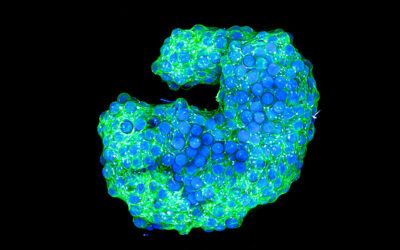5th International Symposium on Phospholipids in Pharmaceutical Research, Heidelberg, Germany, September 18th – 19th, 2017
Meeting Report by Dorothea Gutekunst,PhD and Peter van Hoogevest, PhD
Phospholipid Research Center, Heidelberg, Germany
The Phospholipid Research Center Heidelberg, organised already its “5th International Symposium on Phospholipids in Pharmaceutical Research” from 18th – 19th September 2017 at the University of Heidelberg, Germany. 165 researchers from all over the world attended the meeting. International experts from academia and industry presented in their seminars innovative and new applications of phospholipids. Categorised in five topics: Analytics and Characterisation Techniques, In vitro/Physicochemical Properties, Drug Delivery, Technological Approaches and Skin Application, 69 scientists presented their posters on topics in phospholipid research.
The first day started with a general introduction to phospholipids. PD Dr. Peter van Hoogevest (Phospholipid Research Center, DE) and Dr. Ralf-Olaf Quinkert (Lipoid GmbH, DE) highlighted properties, manufacturing and analytics of phospholipids. An example for the versatile deployment of phospholipids presented Prof. Dr. Alfred Fahr (University of Jena, DE) vividly. His explanations focused on special lipid bilayers, comprising phosphatidylserine, arranged in cylindrical continuous sheets, called cochleates.

The audience enthusiastically listened to news about phospholipid research
The audience enthusiastically listened to these explanations and to the subsequent session on examples of the industrial use of phospholipids presented by Dr. Josbert Metselaar (University of Twente, NL), Dr. Daryl Drummond (Merrimack Pharmaceuticals, US) and Dr. Jürgen Schmitt (B. Braun Melsungen AG, DE). Next to the speakers, exhibitors of different companies facilitated an active exchange between academia and industry as well. Representatives of Particle Solutions Innovations B.V., Avestin Europe GmbH, Malvern Instruments GmbH, Microfluidics and Polymun Scientific presented their skills.
Research projects with a special focus on the parenteral administration of phospholipids were highlighted by the seminars of Prof. Dr. Jean-Christophe Leroux (ETH Zürich, CH) ″Detoxification using parenteral lipid formulations″ and Prof. Dr. Karsten Mäder (University of Halle, DE) ″Phosphatidylserine enriched phospholipids as ant-inflammatory agents″.
The first day concluded with a solemn announcement of the Thudichum-Award winners 2017. The Phospholipid Research Center donated the ″Thudichum Award″ for the second time. Named after the famous German physician and biochemist Johann Ludwig Wilhelm Thudichum (1829-1901), who isolated and characterised for the first time numerous compounds of the brain including phospholipids and related species. He recognised the physiological importance of phospholipids.
This year, the members of the scientific committee awarded Dr. Tom van Rooij (Erasmus MC, Rotterdam, NL) for his outstanding publications in pharmaceutical phospholipid research. Dr. Tom van Rooij examined in the group of Prof. Dr. Klazina Kooiman ultrasound contrast agents formulated in lipid-coated microbubbles for imaging and therapeutic applications. For the first time the ″Thudichum Life Award″ has been awarded. Dr. Herbert Rebmann (Honorary President of the Phospholipid Research Center) congratulated Prof. Dr. Daan Crommelin for his lifelong outstanding achievements in the field of phospholipid research. Prof. Dr. Crommelin is a pioneer in the field of stabilisation and characterisation of phospholipids and liposomes.
Congratulations to Prof. Dr. Daan Crommelin and Dr. Tom van Rooij for their excellent scientific research!
After a first day of discussion, establishing new contacts but also happy reunions among the participants, we had a wonderful and delicious boat trip with the Königin Silvia on the Neckar river.
The second day of the symposium started with a session on ″Oral Administration of Phospholipids″. Prof. Dr. Alexander Treusch (University of Southern Denmark, DK) summarised the latest results on the application of ″Archaeal Lipids in the Oral Delivery of Therapeutic Peptides″, whereas Prof. Dr. Anette Müllertz (University of Copenhagen, DK) elucidated the use of monoacyl-phospholipids in oral self-nanoemulsifying drug delivery systems. A new approach to improve the bioavailability of poor water-soluble drugs with a phospholipid-functionalised calcium carbonate based drug delivery system was presented by Prof. Dr. Jörg Huwyler (University of Basel, CH).
Phospholipids are versatile excipients
The working group of Prof. Dr. Yvonne Perrie (University of Strathclyde, GB) demonstrated, inter alia, the versatility of phospholipids as part of the development of lipid-based delivery systems for oral vaccination.
More focused on the mechanism of action of phospholipids in the human body was the following session. PD Dr. Andreas Koeberle (University of Jena, DE) presented the inhibitory effect of polyunsaturated phosphatidylcholine on Akt (also known as protein kinase B), as a potential treatment target in cancer therapy. Dr. Jai Prakash (University of Twente, NL) demonstrated a new approach in the field of cancer therapy using special liposomes, comprising carboxylated phospholipids, for a targeting to tumor-associated M2 macrophages.
The already mentioned seminars highlighted current innovative phospholipid research and development topics in Europe and North America.
What about phospholipid research in South America e.g. in Brazil?
The last session of the Phospholipid Symposium 2017 ended with a special seminar on phospholipid research in Brazil. Prof. Dr. Frédéric Frézard (Universidade Federal de Minas Gerais, BR) introduced in main research fields, highlighted impressively current ongoing projects and pointed out promising perspectives.
Traditionally, the symposium was concluded by the ″Young Session″ chaired by Prof. Dr. Christel Müller-Goymann (University of Braunschweig, DE). The students of six pre-nominated posters were invited to give a short presentation about their research. The following three posters were selected and awarded with a 500 € poster prize:
Joyce Azzi (Lebanese University, LB): ″Effect of liposome fatty acyl chains saturation on the photostability of encapsulated biomolecules.″
Ana Ferreira-Silva (Universidade de Lisboa, PT): ″Antagonist G-labeled long circulating liposomes actively targeted to lung tumor cells.″
Phillipp Uhl (University Hospital Heidelberg, DE): ″Cell penetrating liposomes enable oral delivery of vancomycin.″
The success of the 5th International Symposium on Phospholipids in Pharmaceutical Research 2017 was based on the many creative minds and inspiring scientists who demonstrated the versatile applications of phospholipids in pharmaceutical research. The authors would like to acknowledge the speakers, poster authors, chairmen, scientific advisory board and the University Heidelberg (Prof. Dr. Gert Fricker and his students) for their support. Special thanks go to Ms Britta Merz and Dr. Torsten Kromp for their contributions to the organisation and coordination of the symposium. Finally, we would also thank all participants for their enthusiastic contributions.
Save the Date!
The next International Symposium on Phospholipids in Pharmaceutical Research will be held on September 9th – 10th, 2019. Until then, you can become a member of the Phospholipid Research Center Heidelberg e.V. and apply a grant to support your academic research on phospholipids. For more information, please visit our homepage www.phospholipid-institute.com.
© 2017 The Authors. Published by Wiley–VCH.
This is an open access article under the terms of the Creative Commons Attribution-NonCommercial-NoDerivatives License, which permits use and distribution in any medium, provided the original work is properly cited, the use is non-commercial and no modifications or adaptations are made.

















